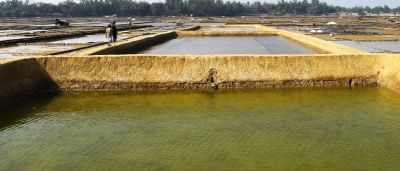Bangladesh farmers transform salt farming with Artemia integration
18 November 2025 | 200 views | Aquaculture, Livelihoods and social issues

This case study documents a sustainable aquaculture initiative in Cox's Bazar, Bangladesh, where artemia farming was integrated into traditional salt production. During the dry season, farmers produce salt on their land; in the rainy season, they now cultivate fish, shrimp, and vegetables on the same plots. Artemia ponds sit alongside tilapia nurseries, shrimp grow-out areas, and vegetable gardens on pond dikes—transforming previously seasonal operations into year-round productivity.
Funded by the EU's DeSIRA initiative, the project reached around 3,000 farmers and their families. Adopter farmers achieved minimum income increases of 40%, with demonstration farmers seeing gains of up to 83%. Notably, the majority of participating farmers opened bank savings accounts for the first time, indicating improved financial security and economic formalisation.
The artemia produced serves as high-quality live feed for shrimp hatcheries, with laboratory testing confirming 51% crude protein and essential fatty acids. It also tested free of major pathogens including white spot syndrome virus. Women received specific training on nutrition and hygiene, gaining self-confidence and greater roles in household decision-making. The approach demonstrates how integrated farming systems can diversify coastal livelihoods whilst building resilience to erratic rainfall, cyclones, and flash floods.
Copyright, all rights reserved.
